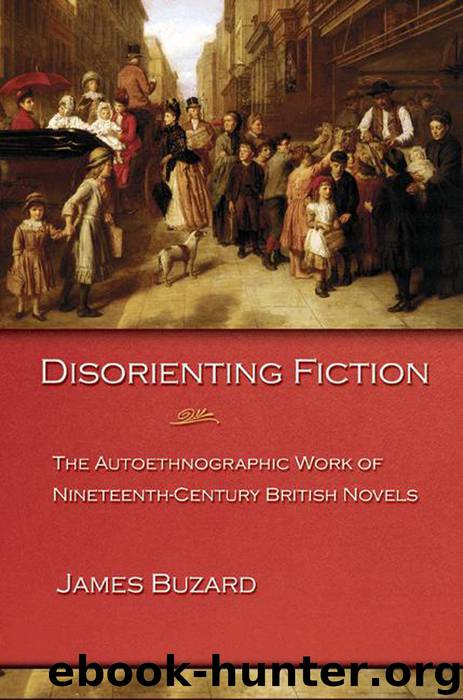Disorienting Fiction by Buzard James;

Author:Buzard, James;
Language: eng
Format: epub
Publisher: Princeton University Press
Published: 2017-03-14T16:00:00+00:00
II
One of Mary Taylor’s reminiscences of getting to know Charlotte Brontë at school, recorded in Elizabeth Gaskell’s Life of the novelist, illuminates a moment in the history of media, identity, and the body. Taylor recalled that Brontë
had a habit of writing in italics ([i.e.] printing characters), and said that she had learnt it by writing in their magazine. They brought out a “magazine” once a month, and wished it to look as like print as possible. She told us a tale out of it. No one wrote in it, and no one read it, but herself, her brother, and two sisters. She promised to show me some of these magazines, but retracted it afterwards, and would never be persuaded to do so. (Gaskell 79)
What must strike us about this memory, and what evidently struck Taylor, was the peculiar lack of “fit” between a certain literary form, firmly identified with the medium of print, and the Brontë children’s laborious manual production and rigorously limited circulation of miniature texts designed to imitate that form. The magazine, a form that flourished in the post-Napoleonic decades in which these children grew up, lives in print and aims at breadth of circulation: it is a leading instance of the sort of text Benedict Anderson has in mind (though he focuses on the newspaper) in his account of the link between print technology and national consciousness. Critics have long recognized the importance of Blackwood’s Edinburgh Magazine and other periodicals to the Brontë household, and it is undeniable that they performed a function like the one Anderson emphasizes, the lifting of local perspectives up to the national plane: from such publications the children gained much of that precocious knowledge of national and world affairs—and those passionately held political opinions—that impressed numerous visitors to the parsonage (cf. Gaskell 115–19; Barker 149). As they had done for Carlyle in tiny Craigenputtock,15 magazines bridged the family’s nearby community and the wider world, providing a conduit of information, taste, and ideology that helped bind that family to a greater British public. I want briefly to consider two points arising from Taylor’s remembrance that complicate this Andersonian perspective, however.
The first of these has to do with the fact that the periodical long acknowledged as holding pride of place at Haworth Parsonage was Blackwood’s Edinburgh Magazine. Anderson emphasizes the standardizing, centralizing force of nationally circulating media, focusing on how the almost infinitely “varied idiolects” of French, English, Spanish, and so on, were “assembled … into print-languages far fewer in number” that could serve as “unified fields of exchange … below Latin and above the spoken vernaculars.” The users of print language “gradually became aware,” he says, “of the hundreds of thousands, even millions, of people in their particular language-field, and at the same time, that only those hundreds of thousands, or millions, so belonged. These fellow-readers … formed, in their secular, particular, visible invisibility, the embryo of the nationally-imagined community.”16 Yet in Blackwood’s and in other influential Scottish periodicals of the post-Waterloo period
Download
This site does not store any files on its server. We only index and link to content provided by other sites. Please contact the content providers to delete copyright contents if any and email us, we'll remove relevant links or contents immediately.
| African | Asian |
| Australian & Oceanian | Canadian |
| Caribbean & Latin American | European |
| Jewish | Middle Eastern |
| Russian | United States |
4 3 2 1: A Novel by Paul Auster(11768)
The handmaid's tale by Margaret Atwood(7429)
Giovanni's Room by James Baldwin(6789)
Asking the Right Questions: A Guide to Critical Thinking by M. Neil Browne & Stuart M. Keeley(5340)
Big Magic: Creative Living Beyond Fear by Elizabeth Gilbert(5332)
Ego Is the Enemy by Ryan Holiday(4927)
On Writing A Memoir of the Craft by Stephen King(4651)
The Body: A Guide for Occupants by Bill Bryson(4565)
Ken Follett - World without end by Ken Follett(4431)
Bluets by Maggie Nelson(4245)
Adulting by Kelly Williams Brown(4217)
Eat That Frog! by Brian Tracy(4141)
Guilty Pleasures by Laurell K Hamilton(4105)
White Noise - A Novel by Don DeLillo(3821)
The Poetry of Pablo Neruda by Pablo Neruda(3804)
Fingerprints of the Gods by Graham Hancock(3726)
Alive: The Story of the Andes Survivors by Piers Paul Read(3718)
The Book of Joy by Dalai Lama(3678)
The Bookshop by Penelope Fitzgerald(3610)
